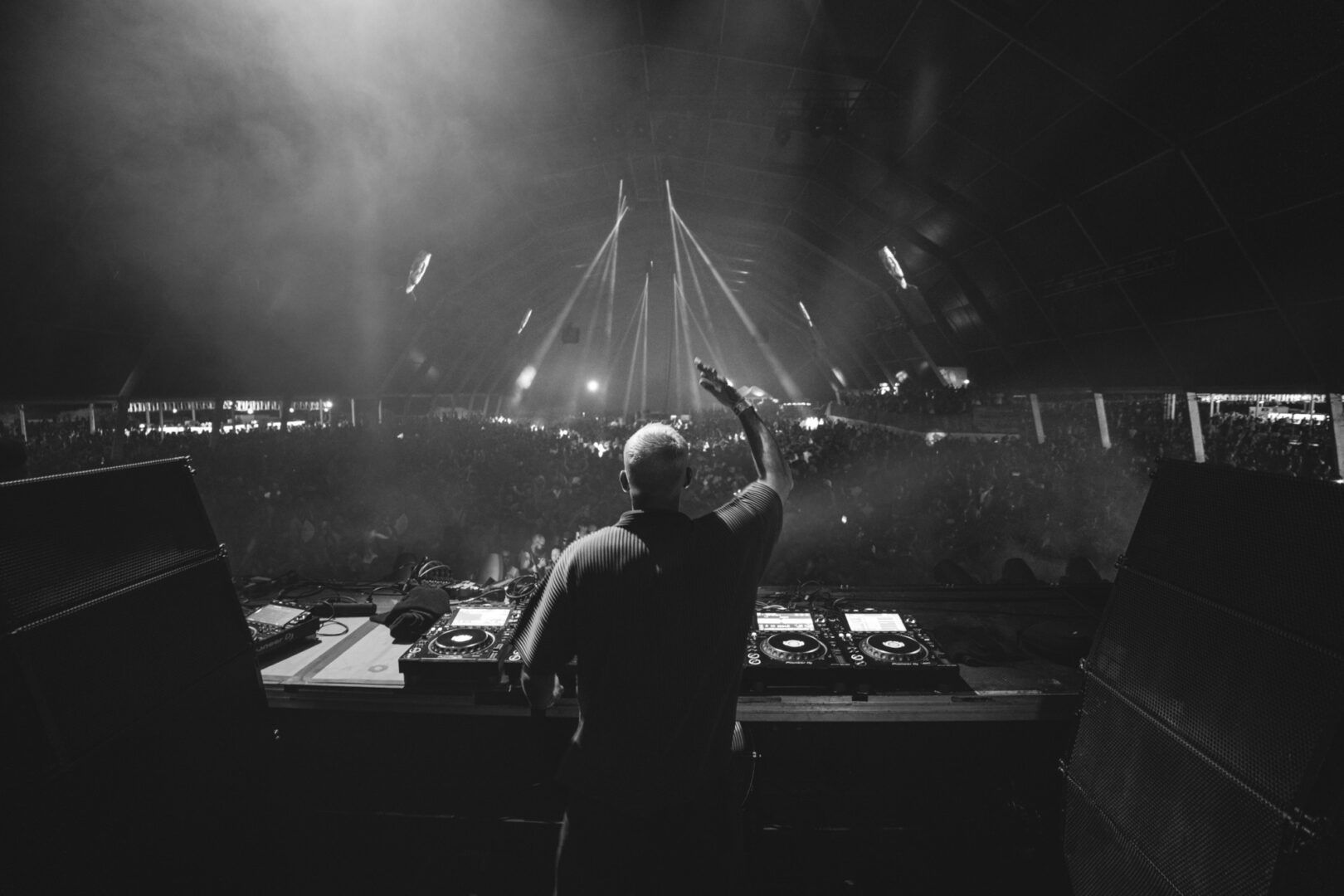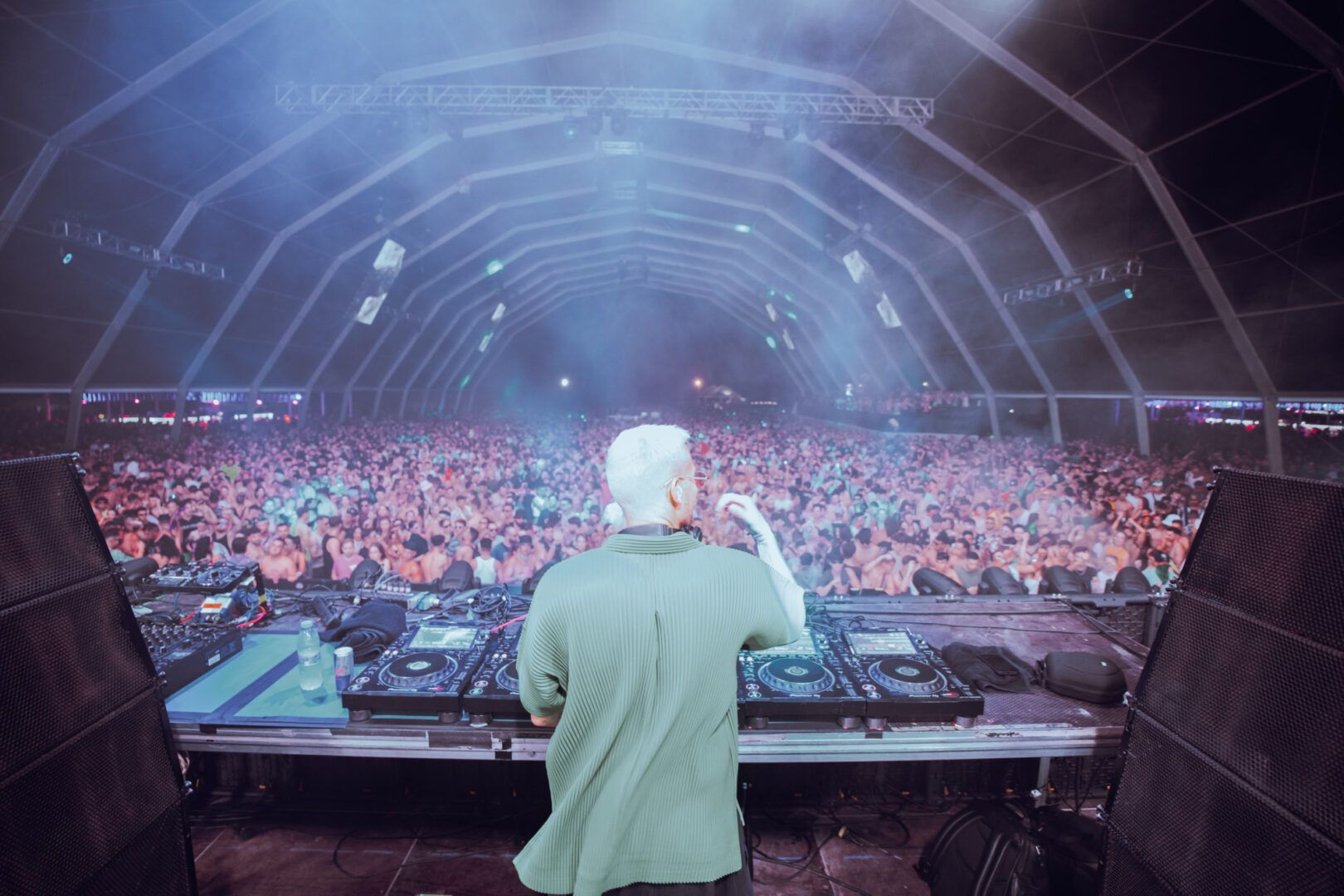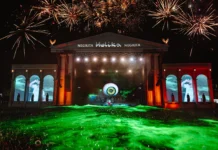Eli Brown se ha establecido rápidamente como un artista de verdadera distinción en el mundo del techno, con sus tracks causando un impacto inmediato como una avalancha de grandes nombres de la industria. Habiendo crecido en Bristol, Eli Brown estuvo expuesto a una rica variedad de influencias musicales, desde la música Jungle a la Rave, desde el Drum n’ Bass al techno pasando por el house. La herencia musical de Bristol ha contribuido a definir el sonido de Eli Brown en una escena de música house superpoblada en la que destaca por encima del resto. Su talento ha conseguido el apoyo clave de todos los rincones del espectro de la música de baile, con artistas de la talla de Carl Cox, Green Velvet, Fisher, Claude VonStroke, Black Madonna, Denis Sulta, Calvin Harris & Annie Mac, todos respaldando las producciones del de Bristol.
Wololo Sound: Hola Eli. Muchas gracias por atendernos en esta entrevista. ¿Cómo ha empezado 2024 para ti personal y profesionalmente hablando?
Eli Brown: 2024 ha sido un buen año. Empezó bastante despacio. Suelo tomarme el mes libre, como enero y febrero. Así que he tenido un tiempo bastante tranquilo, que es cuando me gusta centrarme en escribir música y cosas así. Así que suelo escribir todos mis lanzamientos del año durante ese periodo, que es algo que he estado haciendo encerrado en el estudio. Se viene mucho material nuevo este año. Y algunos se estrenan hoy. Estoy muy emocionado. Y es genial estar en Miami.
Wololo Sound: Hi Eli, Thank you very much for attending all of your time in this interview. How has 2024 started for you personally and professionally speaking about?
Eli Brown: Yeah, 2024 has been a good year. It started pretty slowly. I tend to take some months off, such as January and February. So I’ve had a quiet time, when I like to focus on writing music and new stuff. So I tend to write all my releases for the year during that period, which is something I’ve been locked in the studio working. So expect plenty of new material this year and some debut today. So I’m really excited about that. And it’s great to be here in Miami
Wololo Sound: Ahora te preguntamos por HI-LO y este b2b, ¿qué significa para ti tocar en un festival como Ultra Music en Miami?
Eli Brown: Nunca he estado aquí, pero obviamente conozco la herencia de Ultra. Así que estar llamado para tocar mi primera vez en Ultra es especial, y estoy muy emocionado de tocar en el escenario de la resistencia. Y sí, es genial hacer un b2b con HI-LO. Es un buen amigo mío. Tenemos música en camino. Hemos hecho lanzamientos en el pasado, así que va a estar muy bien.
Wololo Sound: Now we ask you for HI-LO and this b2b, what does it mean for you to play at the festival like Ultra Music in Miami?
Eli Brown: Yeah, sure. I’ve never been here, but obviously I know the heritage of Ultra. So to be booked to play my first Ultra here is a special one, and I’m really excited to be playing on the resistance stage. And yeah, great to be doing a b2b with Hilo. He’s a good friend of mine. We’ve got music coming out. We’ve done releases in the past, so it’s going to be a good one.
Wololo Sound: ¿Cómo habéis hecho este back to back, Oliver y tú? ¿Qué se puede esperar y cuánto tiempo se tarda en preparar un set principal como este?
Eli Brown: Bueno, nos conocemos bien. Hemos trabajado mucho juntos. Este es el segundo back to back que hacemos. El primero fue en Electric Zoo el verano pasado en Nueva York. Tenemos gustos musicales muy parecidos, así que no es tan difícil de preparar. A menudo compartimos canciones y pinchamos las de los demás en nuestros sets, así que es algo muy natural. Simplemente, improvisamos, vamos allí y vemos qué pasa, que es la mejor manera, creo.
Wololo Sound: How have you made this back to back, Oliver and you? What can you expect and how long it takes to prepare a main set like this?
Eli Brown: Well, we know each other well. We’ve worked together a lot. This is the second back to back we’ve done. The first one was at Electric Zoo last summer in New We have very similar music tastes, so it’s not that hard to prepare. We often share tunes, play each other’s tunes in our DJ set, so it feels quite natural. We just wing it, get in there and see what happens, it is the best way, I guess.
Wololo Sound: Nos resulta curiosa tu trayectoria, la forma orgánica que tienes de crecer desde el tech house, aparición en sellos como Tool room o Black Book, al techno, apareciendo en Filth On Acid o Drumcode. ¿Cómo ha sido esta evolución para ti? ¿Sientes que has encontrado tu verdadero estilo
Eli Brown: Sí, sin duda. Hablo bastante de mi herencia. Vengo de la batería y el bajo. Originalmente, fui a ver a Carl Cox en Glastonbury cuando estaba haciendo un set de drum and bass allí, y eso me inspiró para empezar a experimentar con el house techno. Fue un feliz accidente convertirme en DJ de tech house. Pero mis raíces están en la música más oscura y pesada. Así que creo que la progresión natural siempre fue hacer techno, y ahora me siento cómodo haciéndolo y disfrutándolo de verdad, creo.
Wololo Sound: We find curious about your career, the organic way you have to grow up from tech house, apparition of labels as Toolroom or Blackbook, towards techno, appearing in Flith On Acid or Drum Code. How has this evolution been for you? Do you feel that have found your true style?
Eli Brown: Yeah, definitely. I talk about my heritage quite a lot. I come from drum and bass. I originally went and saw Carl Cox at Glastonbury when I was actually doing a drum and bass set there, and that inspired me to start experimenting with house techno. And it was a happy accident for falling into being a tech house DJ, really. But my roots lie within dark, heavier music. So I think the natural progression was always to make techno, and I feel comfortable now doing that and really enjoying it, I think.
Wololo Sound: ¿Cuáles han sido sus influencias más recientes?
Eli Brown: Todo el tiempo recibo influencias, de cualquier cosa y de cualquier lugar. Por ejemplo, me gusta mucho Artemis. Es una especie de pop new wave que escuché mucho hace poco y me inspiró. Hice un pirata en el avión de camino aquí, que probablemente tocaré esta noche. Así que mis influencias están en el extranjero, y vienen de cualquier parte. Puede ser estar en una ciudad. Eso puede inspirarme. Podría ser escuchar a un DJ, por ejemplo, y un club, y escuchar algo, y volver a casa, y eso me inspira. La inspiración viene de cualquier parte. Y eso es lo que me gusta de hacer música. No es lineal, no es rígido. Lo asimilas todo y lo aplicas a tu música. Y creo que de ahí viene el sentimiento.
Wololo Sound: What have been your most recent influences?
Eli Brown: I’m getting influences all the time, from anything and anywhere. For instance, I really like this guy, Artemis. He’s like a new wave pop act, and I was listening to him loads recently, and that inspired me. I made a bootleg on the plane on the way here, which I’ll probably play tonight. So my influence is abroad, and they come from anywhere. It could be being in a city. That could inspire me. It could be listening to a DJ, for instance, and a club, and hearing something, and going home, and that inspires me. Inspiration comes from anywhere. And that’s what I love about making music. It’s not linear, it’s not rigid. It’s you taking everything in and applying that to your music. And that’s where the feeling comes from, I think.

Wololo Sound: ¿Qué crees que es la música techno? ¿En que punto esta la música techno en Estados Unidos ahora mismo?
Eli Brown: Creo que está probablemente en el mejor estado en el que ha estado nunca, ¿verdad? Se está abriendo camino en los escenarios principales. Cada vez es más popular. Hay quien dice que eso es negativo porque se sale del underground. Pero para mí, creo que con esta música, cuanto más podamos abrir a la gente que quizá venga de los bailes mainstream para que escuche la música que todos amamos. Es algo estupendo. Así que estoy muy contento.
Wololo Sound: What do you think techno music is? What the point of techno music is in America right now?
Eli Brown: I think it’s in probably the best state it’s ever been, right? It’s making its way onto main stages. It’s becoming more popular. Some people argue that’s negative because it’s taken from the underground. But for me, I think with this music, the more we can open people that perhaps come from mainstream dances is to listen to the music that we all love. That’s a great thing. So I’m really happy.
Wololo Sound: Somos de España como sabes y en España somos techno y somos de 130 y 140 BPMs. La gente más joven consume ahora mucho techno industrial, hard techno, este movimiento, ¿Cómo valoras este movimiento del hard techno?
Eli Brown: Creo que es natural. La música es cíclica. Cuando me metí en la música a principios de los 90, había música rave, jungle techno y cosas así. Todo iba de 150 a 160 BPM. No es raro que haya ciclos. Creo que lo que ha hecho es abrir los límites de los BPM. Hace dos o tres años, antes de COVID, estábamos atascados entre 130 y 133 BPM. Ahora toco desde 133 hasta 145, 150 a veces. Los límites se han ampliado y eso te da más libertad creativa para pinchar y hacer música más amplia, que es algo que me gusta.
Wololo Sound: We’re from Spain. As you know, we’re techno. It’s 130, 140 BPMs. Younger people are now consuming a lot of industry techno, hard techno, this movement. Yeah, sure. How do you assess this hard techno movement?
Eli Brown: I just think it’s natural. Music is cyclical. When I got into music in the early ’90s, it was like rave music, and it was like jungle techno, things like that. That was like anything from 150 to 160 BPM. It’s not uncommon for cycles to come around. I’m not mad about it. I think what it has done is it’s opened the boundaries for BPMs. Two, three years ago, pre-COVID, we were stuck between like 130 and 133 BPM. Now I’m playing stuff anything from 133 up to about 145, 150 sometimes. So the lines have got bigger, and that gives you more creative freedom with your DJs DJ sets and making music to be a bit broader, which is something that I like
Wololo Sound: Ahora mismo, estáis en una gran gira por América, Europa y muchos más. Qué diferencia encuentras en cada continente? Qué notas de especial, por ejemplo, en España?
Eli Brown: Me encanta Sudamérica. Me encanta España porque creo que la gente latina sólo quiere bailar y salir de fiesta, es diferente al Reino Unido. Es como una cultura diferente. Personalmente prefiero venir a países latinoamericanos porque, como digo, la gente quiere salir tarde, comer tarde, quedarse hasta tarde, salir de fiesta, y lo llevan en la sangre. Así que lo disfruto mucho.
Wololo Sound: Right now, you’re in a big tour in America, Europe, and so on. What difference do you find in each continent? What do you notice special, for example, in Spain? Yeah.
Eli Brown: I love South America. I love Spain because I think Latin people, they just want to dance and they want to party, which is different to the UK. It’s It’s like a different culture. I personally prefer coming to Latin-American countries because like I say, people want to go out late, eat late, stay out late, party, and it’s in their blood. So I really enjoy it.
Wololo Sound: Dos preguntas más. Estuvimos muchas semanas escuchando vuestro tema ‘Believe’. Necesitamos preguntarte sobre esta canción
Eli Brown: Claro. Me gusta que mi música sea sencilla. Creo que no hace falta mucho para hacer un gran tema. Algo que siempre tengo en la cabeza es que si soy un artista rave, y estoy en una rave, ¿qué me voy a ir a casa escuchando y recordando de un DJ que pincha 30, 40 temas? Así que siempre estoy pensando en cómo puedo poner algo vocal en todas mis canciones y creo que esto es sólo un ejemplo de ello. Encontré una buena voz. Un tema muy sencillo, como una batería sencilla, un bajo sencillo, una voz memorable. Una vez que tienes esos elementos básicos, no creo que necesites mucho más. Creo que la belleza de la buena música de baile es su simplicidad. No hace falta complicarla demasiado y creo que ‘BELIEVE’ es un buen ejemplo de ello.
Wololo Sound: Two more questions. I was many weeks in love with your track, Believe. I need to ask you about these songs.
Eli Brown: Sure. I like to keep my music simple. I think it doesn’t require a lot to make a big track. Something I always have in my head is if I’m a rave artist, and I’m at a rave, what am I going to go home listening and remembering out of a DJ who plays 30, 40 tunes? So I’m always thinking about how can I put some vocal ear worm into all my tunes and believe it’s just an example of that. I found a good vocal. Very simple track, like simple drums, simple bass, memorable vocal. Once you’ve got those core elements, I don’t think you need much more. I think that’s the beauty of good dance music is the simplicity, almost. You don’t need to overcomplicate it. I think BELIEVE is a real strong example of that.
Wololo Sound: El último sobre tu futuro. Qué ideas tienes en el bolsillo ¿Algún spoiler exclusivo?
Eli Brown: Tengo un montón. He estado muy ocupado desde que me tomé enero y febrero libres. Pero este año puedes esperar colaboraciones con HI-LO. Tengo dos en camino en mi sello, Arcane. Tengo un EP de dos canciones, solo tracks, que saldrá en mi sello, Arcane, con Lily Palmer, que saldrá la semana que viene en Factory 93. Y más adelante en el año, voy a publicar un disco con Hilo. Y más adelante en el año, tengo una colaboración con Adam Bayer. Así que un gran año de lanzamientos. Vale, perfecto. Si, gracias. Gracias. Muchas gracias. Muchísimas gracias. Gracias, chicos.
Wololo Sound: The last one about the future. What ideas do you have in your pocket any spoiler exclusive?
Eli Brown: I’ve got loads. I mean, I’ve been a busy boy since I took January, February off. But this year you can expect collabs with Hilo. I’ve got two coming on my label, Arcane. I’ve got a double track ERP of my own, Solo Tracks, coming on my label, Arcane, released with Lily Palmer, which is coming out next week on Factory 93. And later in the year, I’ve got a collab with Adam Bayer. So big year of releases. Okay, perfect. Yeah, thank you. Great. Thank you. Thank you very much. Thanks, guys.










